Sometimes it is hard to boil down the essence of what makes a character indelible. At other times though the depth of a character is clear. From his very first scene in the pilot all the way through to his last scene in the penultimate episode (“Institutional Memory”), Tobias Zachary Ziegler is irascible, uncompromising, and constantly on the edge of being overwhelmed. He is also funny, lovable, and self-effacing. There is something about the essence of Toby Ziegler, and of Richard Schiff’s performance, that is deeply affecting and speaks deeply to the viewer, and this makes the character one of the most compelling on The West Wing, and in the history of television.
To Shine a Mirror Darkly
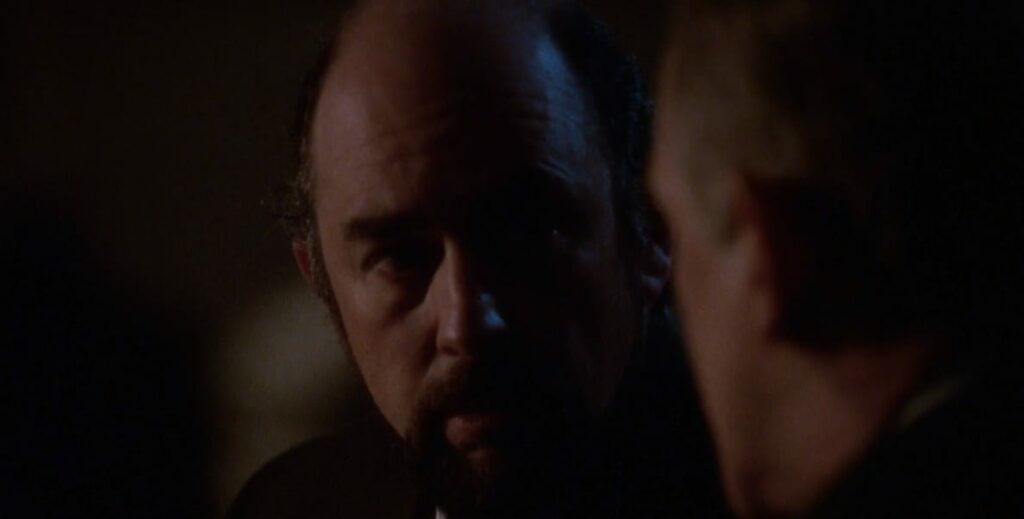
Aaron Sorkin, the creator of The West Wing, has long been accused of using his characters as mouthpieces for his own ideas and political opinions. While there are examples where it is true, this critique is mostly without merit. Yes, many of Sorkin’s characters express opinions that are in line with his own—it is is only natural for the products of a creator’s work to reflect the views of that artist after all—but they usually do it within the confines of the character.
With that said, there is always at least one character in each Sorkin show who, more than any other, is an avatar for Sorkin in some way. This is usually the main character, such as Will McAvoy in The Newsroom. But in The West Wing, it seems clear that Toby is the character who embodies how Sorkin would see himself in this story. Toby expresses himself through the written word. Toby is difficult and irascible and often righteous. And Toby is politically an idealist who, through age and loss, has become much more of a pragmatist. It seems like all of that is at least a thematic parallel to Sorkin’s own life experiences.
Yet through Sorkin’s writing and Richard Schiff’s performance, Toby is also much more than that. The character—far from being just a vessel for Sorkin’s takes—is a fully realized human being. This is because it isn’t just Sorkin who Toby mirrors. To identify with Toby is to see the insecurities within yourself. This makes him an indelible character, etched in the hearts of those who see themselves in him. And it also makes him a difficult and challenging character to like for those who don’t see those things in themselves. Instead of being all things to all people, Toby is instead a very specific thing for a very limited group of people.
Toby is brilliant and talented. This is never really in dispute, even when he is trying desperately to “find the talent.” However, that brilliance is not a propelling force for him; it is often that very brilliance that holds him back. Toby’s flaws are part of his appeal. He isn’t quite able to cope with the hand he is dealt, even when it is a winning one. Toby is often lost and at a loss because of this. Toby is hard because the world is hard, but he is also soft and emotionally vulnerable. His bear-like essence is born of the losses and unknowability of life.
Before working for the Bartlet campaign, Toby had been a loser in every one of his political jobs. All of this added together to create a self-destructive streak that never left him. His politics are shaped by a relentless sense of optimism, but that is undercut by the reality of political life. He is a brilliant writer who will always be most remembered by words no one will ever associate with him because they are not even crafted in his own voice. The love of his life and mother of his children doesn’t understand what motivates him. His lasting legacy in the greatest job he will ever have is to be a pariah. His best friend spent the darkest year of his life not speaking to him. And, oh right, his father was in Murder Inc.
The Right Actor in the Right Part
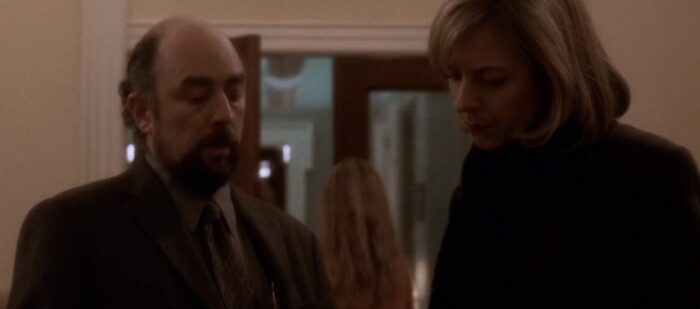
All of this is played to a simmering boil by Richard Schiff. Schiff is an interior actor. His true genius is in the scenes where he has no dialogue at all, but his reactions and presence are still palpable. This is essential to the allure of Toby. It is impossible to imagine other actors in the role. Eugene Levy, for example, who was originally considered and is also great, is so very different in both style and substance. Schiff makes every single moment he is on screen into a master class on how to give to other actors. He is also quite masterful at giving captivating reactions to what his scene partners are doing.
Unsurprisingly, Schiff started his career working mostly in theater and focusing on directing. Even when he was young and new to the profession, his was never the flashy style of the leading player. Instead his performances, even then, show the slow-building style of a professional career artist in the field. In his small roles in films like Jurassic Park and television shows like Doogie Howser, M.D., Schiff always brought a sense of gravitas. While it seems likely that Toby will always be the defining role of his career, he has also worked steadily and done great work since The West Wing ended. I’ve never seen an episode of The Good Doctor, but every time I see Schiff in the promos for it, I almost want to check it out.
Of course, the dream would be for Schiff to be cast in another Sorkin show. He is able to understand and interpret the works and rhythms of Sorkin in a deep manner. The words are many and they need to be delivered at an incredible pace. Sorkin’s dialogue has proven difficult for even the best of actors. For Schiff’s performance as Toby, the challenge was even greater. Unlike with Josh Lyman (Bradley Whitford) or President Bartlet (Martin Sheen), his character is not naturally a “fast talker” attuned to the Sorkinesque rhythms. Toby is often methodical, impulsive yes, but driven from within at a simmer. The great accomplishment of Schiff’s performance is that there is nothing performative about it. Toby Ziegler’s sadness, rage, genius, and skills are always on display because all of those things are delivered in a real and transformative manner by Richard Schiff.
Taking Their Eyes off the Ball
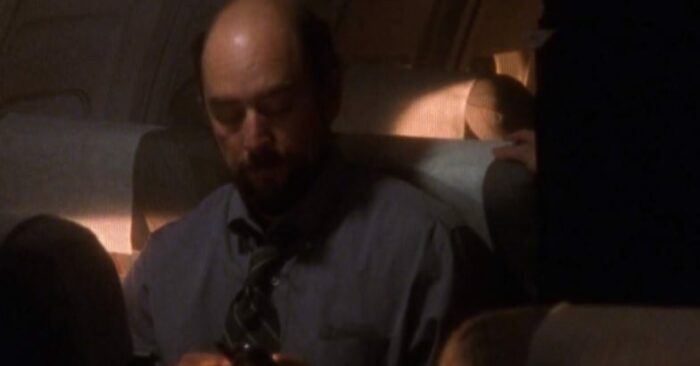
After Sorkin left the show following the fourth season, Toby was set adrift. It seems that the creative team lost track of both what made the character interesting and what made Schiff great in the role. Even before the “shuttle leak” plotline that ends the series for the character, the writers have Toby wandering through out-of-character plots and interactions that just don’t quite work.
Whereas Sorkin, identifying as a writer, always had the writer in the forefront, the new team focuses almost entirely on the political side of things. Their idea of a great story is not the creation and delivery of a perfect State of the Union speech but is instead the Shakespearean drama they have built up with the Bartlets. The words and ideas that made Toby (and his relationship with President Bartlet) so essential have lost their central place in the story.
The “shuttle leak plotline” that hangs over the last season and a half of The West Wing is probably the most egregious example of this. Instead of focusing the story on the characters we have grown to know and love, the focus becomes the mystery of who leaked the information and the drama of the fallout. Schiff himself has gone on the record many times discussing how much he feels this storyline was a disservice to the character (including most recently on The West Wing Weekly podcast). For many people, this leaves the character irredeemably broken, but even in this maddeningly incongruous plotline Schiff’s skill and the character’s inherent greatness shine through, especially in his relationships.
In many ways, Toby is defined in relation to the other characters. In each pairing, a different aspect of his personality comes to the forefront. In each situation, there is a different vision of what Toby represents because the other person either allows him to become his better self or forces him to present a version that is more in line with the expectations of most people. This is certainly the case throughout the series with Toby and C.J Cregg (Allison Janney).
We Get Continued Next Week: Toby Ziegler and C.J. Cregg
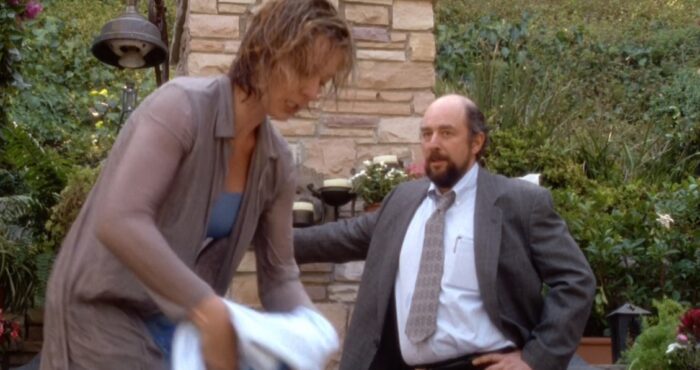
In the second-to-last episode of the series, Toby has one final scene with C.J. There is a break in all the angst when C.J. comes to visit Toby at his apartment. Toby is alone and sad, making chicken, and the two of them are able to have one last great scene between the two amazing actors. The writers leaned into some of the more external (and less compelling) aspects of the character. Schiff is still great, though, and Toby still has some fantastic moments.
Toby and C.J. share a truly platonic friendship. This doesn’t mean there isn’t flirtation and sexual chemistry, but at heart Toby and C.J. are friends. Friendship is complicated and the world has a hard time understanding exactly what it means. For Toby and C.J., it is a sense of partnership that builds each other up and pushes each other through the hardships before them. It feels important that, while they have chemistry and sexual tension, these two characters don’t have a romantic or sexual relationship. They love each other fully, but they love each other in a way that is not defined by those narrowing notions of nonsense.
Quite a lot of the success of the relationship is because Allison Janney and Richard Schiff, both of whom are incredible in any situation, are exponentially more compelling when they share a scene. Both are masters at the idea of “giving” to the actors and so their presence in any scene simply elevates the quality of everything that happens. This also makes any time they share a scene together sizzle. Even though, from time to time, you may need to “avert your eyes.”
The Prodigals: Toby Ziegler and President Bartlet
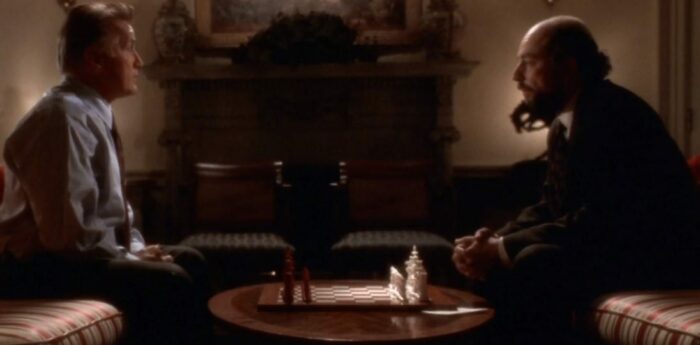
The relationship between Toby and President Bartlet crackles too, but for entirely different reasons. Even early in the series, before they each feel they have betrayed each other, there is tension between the two, and this tension only gets greater as the years pass. But the fundamental issue is not a difference of substance between them; it is a difference in the way each of them feels they are called to wield their own gifts.
For Jed Bartlet, long before he became President, the world has always been his playpen. He is not only “the smartest kid in the room” (as Toby calls him in “Hartsfield Landing”); he is the smartest person in any room. Bartlet’s intelligence is the tool he uses to be successful. In contrast, Toby’s intelligence is often what holds him back. It isn’t a matter of scope—both are brilliant and they recognize that in the other; instead, it is about the notion that each sees the other as wasting some aspect of the gifts they are given.
Toby is also the cudgel to Bartlet’s scalpel. Bartlet relies on Toby to give him his actual voice. The relationship between speechwriter and speaker is fascinating. The writer is the wordsmith, but those words are given in the voice of (and for the purposes of) the speaker. Especially during the Sorkin years, this relationship is a primary point of emphasis at many turns. The dramatic tension between the two can be seen in both the speeches and in the quiet moments throughout the series.
But there is also a deeper sense of division that sometimes comes between them. In the Season 2 episode “17 People,” Toby is nearly broken by the news of President Bartlet’s multiple sclerosis cover-up. Some of Schiff’s best work in all of The West Wing is in those scenes where he processes that information. He had trusted Barlet to be not only the guy, and his guy, but to represent the greater angels that he never could see inside himself. In that moment, all of that is inverted, as is Bartlet’s anger at Toby in the scenes—which is also really anger at himself. Toby is able to put the pain aside, and by the next episode it is Toby who is there to help the others process the news, but the relationship is never entirely the same.
No matter the nature of the relationship though, the two characters’ interactions and clashes are essential throughout the show. Toby was the one who pushed Bartlet to be the very best of his possible selves. And, by being the vessel for his words, Bartlet allowed Toby’s real genius to flourish.
Love’s Labour’s Lost: Toby with Andy, Huck, and Molly
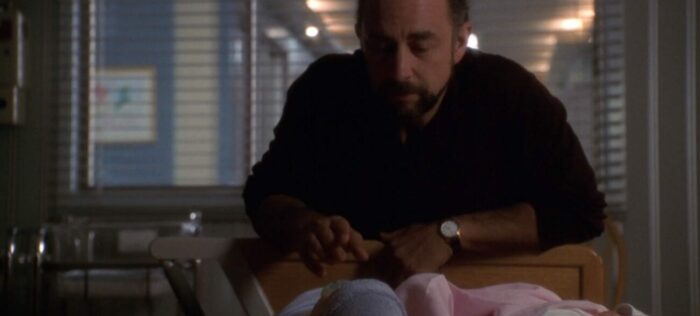
One of the most essential storylines for understanding Toby is one of the few on the show set outside of the West Wing. Early on, the show introduces Representative Andy Wyatt (Kathleen York), Toby’s ex-wife. We learn that they split up early in the first year of the Bartlet presidency, but they continue to communicate and eventually get back together.
Andy brings out the softer side of Toby in many ways, but this softness is neither normal nor long-lasting. Toby wants to be a normal lover, but he is incapable of the types of things that make normal relationships last. Andy as a character is well served as she both never gives in to Toby, nor does she come across as unlikeable.
While their relationship has its ups and downs, they wind up having twins, which leads to one of the purest moments of the series for Toby. Before the kids are born, Toby is afraid that his sadness and anger will make him a bad father or not allow him to love his kids. The scene where twins Huck and Molly are presented to him puts all of this to rest, though. Schiff’s face is one of incredible but joyful sadness. And that feeling, that incredible sense that there is no limit to the love he can have for these kids, sets aside any notion that he incapable of love. He can love, and he does love, even if it is sometimes difficult for both parties.
Brothers in Arms: Toby Ziegler and Josh Lyman
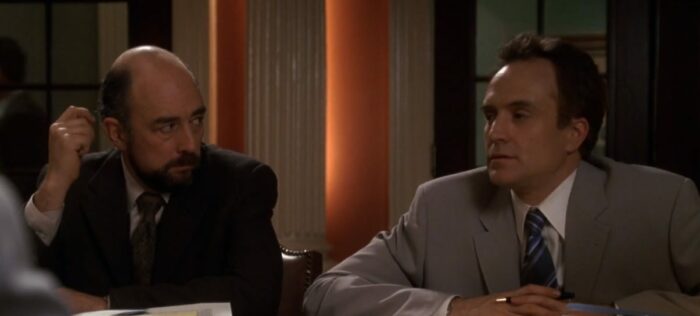
The relationship between Toby and Josh (Bradley Whitford) is often difficult. Unlike Josh, Toby is a practicing and committed Jew, and he goes to temple and abides by his Rabbi’s commandments. It slowly becomes evident that his Jewish identity is of great personal and symbolic importance to him, and it clearly shapes his life and decisions in fundamental ways. But this is always on the edges—like so much else about Toby, it takes time, effort, and a compassionate eye to see what is really going on with him. This often leaves him at odds with the more impulsive Josh, but the two of them are clearly close in their own ways.
Josh and Toby are very different, but they work well together most of the time, like when they are fawning over the brilliant Evelyn Baker Lang. Neither of them is afraid to bust heads to get what they think is right. Both want to push President Bartlet’s agenda and are in awe of the work they do. For years they are like brothers in arms, fighting alongside each other to do the work and, hopefully, take down some Republicans along the way. But then things change. The scenes after Josh leaves to work for the Santos campaign are some of the most difficult of the series. Toby is hurt and angry by Josh’s “betrayal,” and Josh is unable to see past his own righteousness to understand Toby’s pain.
This all plays out in the later, post-Sorkin seasons of the show. Sorkin famously likes to have his main casts work well together, particularly on The West Wing where they always had each other’s backs. But in this plotline, and the mirroring and equally disturbing rift between Leo McGarry (John Spencer) and Jed, the John Wells era prefers to mine the relationships of the main characters for drama. While this certainly leads to some interesting interactions, these scenes—especially the physical fight between Toby and Josh—never seem to quite capture the characters we know and love.
Going Home
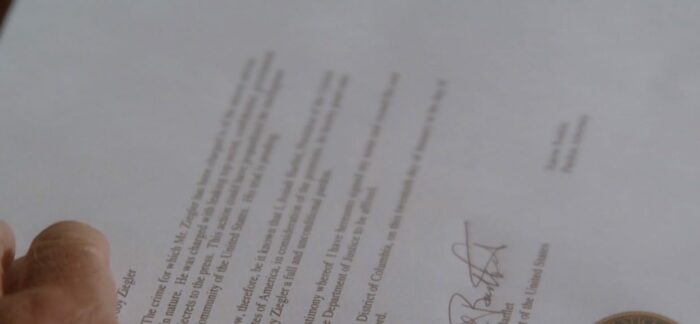
These reflections hardly even break the surface of the way that Toby as a character is interwoven into the fabric of all the other characters. To Sam Seaborn (Rob Lowe), Toby is the mentor, prickly and unimpressed but constantly guiding his growth. With Will Bailey (Joshua Malina), Toby wants to create the relationship he has with Sam but is instead put into the position of a rival. There are incredible moments between Toby and Charlie Young (Dulé Hill), and between Toby and Leo as well.
Toby Ziegler remains one of the most fully realized characters in the history of television. He is sad, but that is not all he is. He is a brilliant writer but is unable to break free from the pains that define him. His past, his pain, his joy, and his impact on those around him are all deeply felt and fascinating to revisit. Each re-watch of The West Wing deepens the connection to the characters. At the center of it all is a deeply passionate, massively flawed, human character.
That is Toby. He is not the golden orator that will have statues built in his name. He is not the brilliant person who (I think) chose to reshape the world, or the political savant, or even the loving heart that keeps it all together. He is a little bit of all of that, but most of all he is the one who pushes each and every one of the characters to be the best and the most that they can be. Richard Schiff grounds the show and lifts up everyone else by embodying Toby Ziegler, and we are all better for it.
“Listen, when you get home tonight you’re going to be confronted by the instinct to drink alone. Trust that instinct. Manage the pain. Don’t try to be a hero.” – Tobias Zachary Ziegler


Fascinating article. The thought that Toby could stand by watching his beloved co workers deal with accusations for something Toby did, is ridiculous. I am going to read your article again, and maybe more agains than one. It brings aspects of Toby’s character to my attention that I haven’t previously understood despite multiple West Wing series binges. Thank you.
…Toby was probably my favorite character, but only as I aged and rewatched episodes. He was very deep and the first go around didn’t allow for that…
Easily the most complicated character, on a certain level. President Bartlett, the other, most front and center, obviously. But without Toby, there is no reliable center of emotional conflict. Politics is a constant war between what’s moral, what’s good for the politician, and what’s good for the constituents. Toby, as played by Mr. Schiff, embodied that struggle brilliantly.
Very well though out, I’d love to see a similar analysis of all the major characters
As would I!
In todays world i wish it was back on tv!! One of best evers no doubt, besides i gotta show my buddy the way outta this hole, great article
Wow, thanks man. Toby Z and Greg House are my all time 2 fav TV Characters, for many of the same reasons. Emotion spills over into everything, genius, and eternal optimism. Greg House became a doctor because a Japanese “untouchable” physician working as a Janitor was the only person in the hospital who could be depended upon to always “be right, and when you’re right, nothing else matters.” With Toby, his religion drove him toward humanity for all, always. And though his religion was almost invisible, it was more powerful than any other single force in the entirety of TWW. Thank you for writing this. Do you have a similar analysis for Greg House MD?
What an incredible article. Toby has always been my favorite character. I don’t think the show would have worked quite as well without him. I hope you write analyses on the rest of the main cast.
Agreed. Great article and interpretation of Toby! I’m currently re-binging the series and this gives me a new lens in which to watch with. Please delve into the rest of the cast!
Brilliant article captured Toby perfectly.
I have watched thus series many times. Each time I have a new favorite character that I appreciate more. I agree and hope you do an in depth on each of the characters. They all deserve it.
Toby was my favorite plus Sam
The best television series by far and although I am reminded of its greatness every time I see clips, my focus on which is my favourite character always changes. I think that was part of the brilliance of the show. Even minor characters can be favourites for a while……
Great article! I will only say that Andy was less than likable in the “house scene” but there may be a gender component involved, and/or, that’s what the writers were shooting for.
THANK YOU!! That is the one area of this analysis with which I disagreed…I felt that Andi was VERY unlikable and seemed to be doing everything she could to hurt Toby, but that could just be my affection for the character speaking.
Easily one of the best analyses I’ve ever read about a West Wing character – some lines of this had me absolutely shook
Great article I do agree that toby was 0ñe of the best character of the show and the choice of Richard Sçhiff to play the part was a good one
So happy that Richard Schiff’s positive comment on Twitter sent me to read this character analysis of Toby Ziegler. I most appreciated your points regarding Schiff’s superior interior acting style, and the brilliant way that he responds to his fellow performers. I love that there is parallel process to his style and to the way the character is developed in response to the other characters. Great read!
Beautiful work! An in-depth look at one of the most complicated and brilliant characters!! Bravo!